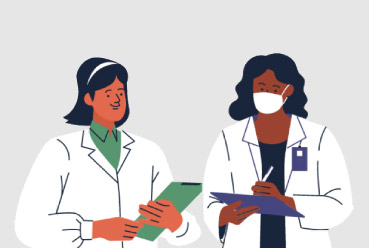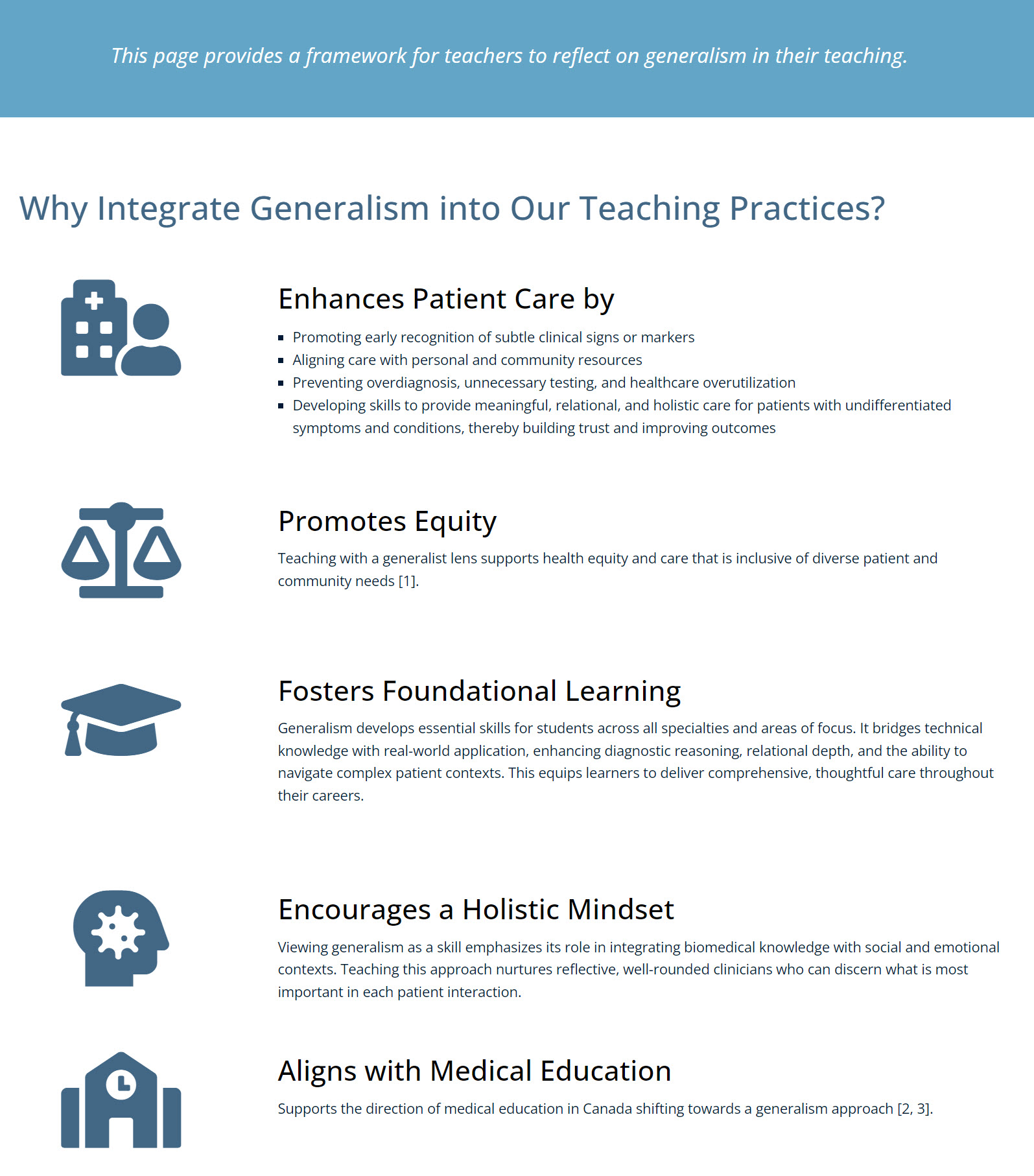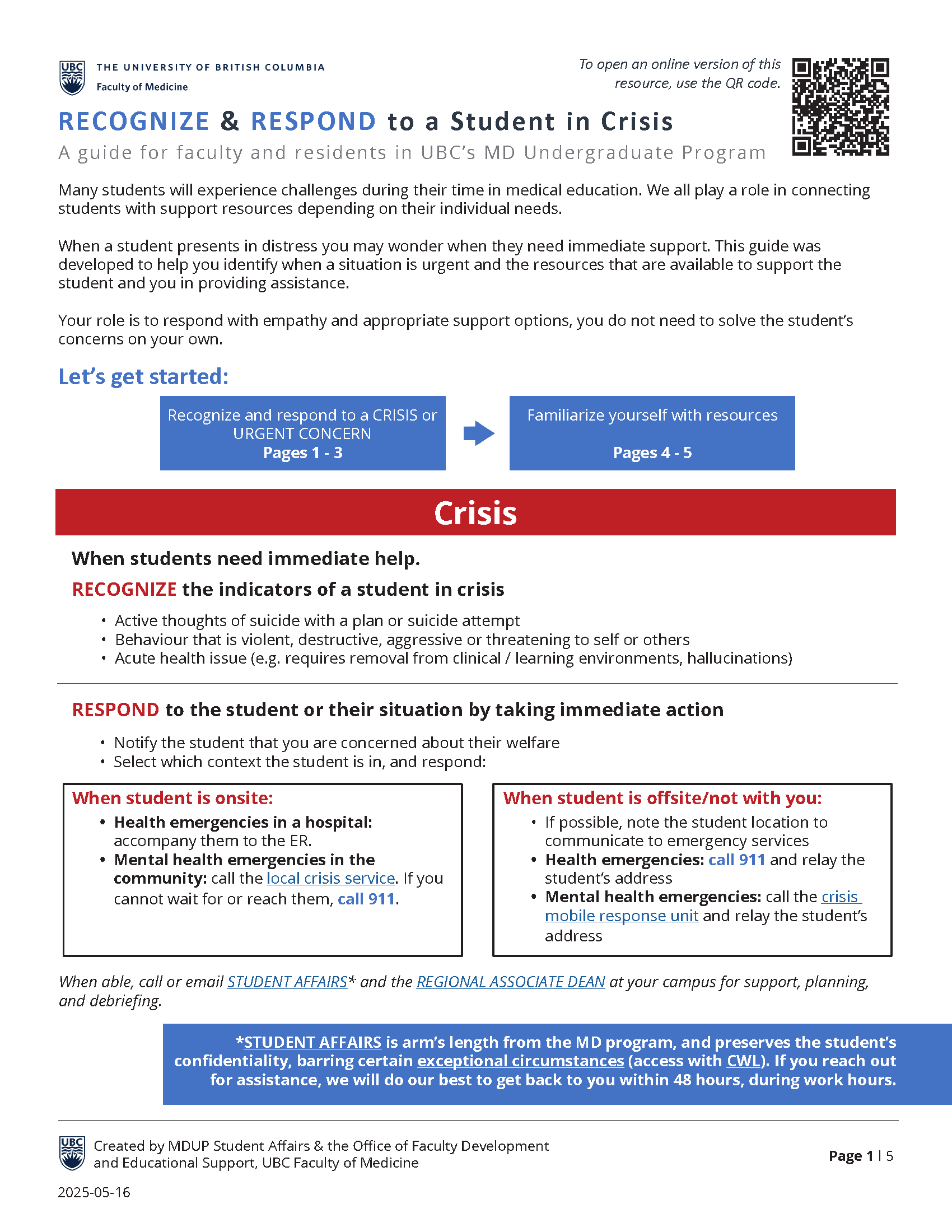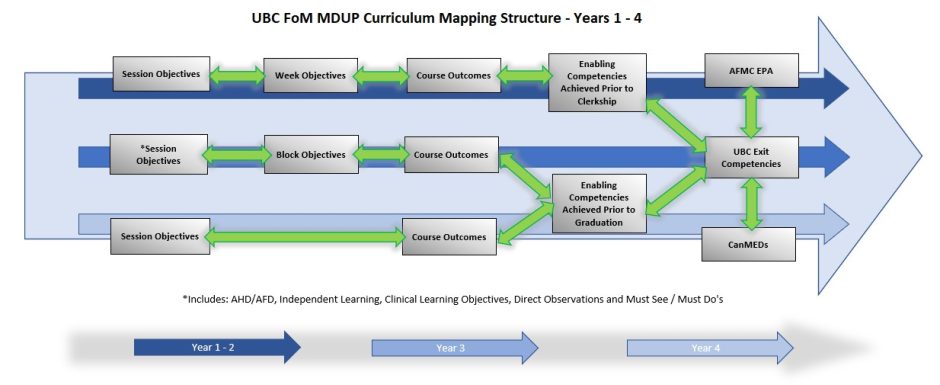Resources for Lecturers in the MD Undergraduate Program
Design and Deliver Effective Lectures – Module and Resources

Start with this module
Design and Deliver Effective Lectures
Time management, content organization, understanding the curriculum, slide design, learner engagement, and inclusive language and visuals. Information in this module is based on relevant literature on teaching principles, teacher assessment data, and interviews with medical students, experienced lecturers, and course leadership.
This module is accredited for 1.0 MOC Self-Assessment Program (Section 3) and Mainpro+ credits.
Generalism in Teaching: Key Concepts for MD Undergraduate Program Teachers
This resource is designed to offer practical examples and strategies for further integrating generalism into your teaching approach, and to reflect on what you are already doing.
Generalism is the skill and philosophy of seeing the whole person in healthcare by integrating relational, contextual, and meaningful aspects of a patient’s life with their physical health. Integrating generalism as a teaching approach involves incorporating a broad scope of complex clinical scenarios, undifferentiated presentations, and care that is comprehensive.
Inclusive Language Guide
UBC is committed to supporting teachers in implementing inclusive course design and teaching practices. This inclusive language guide is developed by the Office of Faculty Development & Educational Support, and the Office of Respectful Environments, Equity, Diversity & Inclusion, and is designed to support those teaching in lecture, small group, and clinical settings.
Lecture PowerPoint Template
This is a PowerPoint that lecturers can use for lectures in Years 1 & 2 (MEDD411/412/421/422). It contains a title slide, an editable land acknowledgement slide, a conflict of interest slide, an objective slide and the second-to-last slide in this slide deck is a reminder for students to complete their Teacher Assessment Form.
Successful Session Checklist
This one page document provides tips for delivering a successful session using PowerPoint. Summarizes key points from the Design and Deliver Effective Lectures module, inlcuding slide organization, slide design, delivering an engaging session and slide submission and recording permissions.
Recognize and Respond to a Student in Crisis
Created by MDUP Student Affairs and the Office of Faculty Development, this resource helps you identify and differentiate the severity of a student’s distress and enables you to guide them to the most appropriate resources and supports.

Familiarize yourself with the curriculum, week objectives and exit competencies
MDUP Curriculum Overview
This page outlines the Year 1, 2, 3 & 4 courses in the MDUP program. Get an overview of MEDD courses by year:
-
- Year 1 – MEDD 411, 412, 419
- Year 2 – MEDD 421, 422, 429
- Year 3 – MEDD 431
- Year 4 – MEDD 440, 448, 449
Explore in the curriculum in the MD Undergraduate Program (MDUP).
Year 1 & 2 Curricular Week and Week Objectives
An up-to-date list of all curricular weeks and week objectives for MEDD 411/412/421/422. For more details covering the individual objectives, the ‘Slide Organization – Understanding the Curriculum’ section in the ‘Design and Deliver Effective Lectures’ module contains a step-by-step guide on how to access this information in Entrada.
Mission, Goals & Exit Competencies
The mission of the MD Undergraduate Program is integral to the vision of the Faculty of Medicine, “Transforming Health for Everyone”; and embodies the values of respect, integrity, compassion, collaboration, and equity.
Explore in detail the mission statement, goals, and exit competencies of the MD Undergraduate Program (MDUP).

Find additional materials and resources for your lecture
Course Readings to Support Undergraduate Medical Education (UGME) Instruction
This document outlines how to select reading materials for your course/session.
Land Acknowledgement Resource
Doing a land/territory acknowledgement helps insert an awareness of Indigenous presence and land rights in everyday life. This quick guide describes how to create and deliver a digital land/territory acknowledgement and why it is important to promote awareness.
Living Library Catalogue
This MS Word file contains a link to and descriptions of video vignettes of real patients and caregivers (Health Mentors) talking about their health care experiences and is available for educational use. Their stories illustrate important topics in health professional education.
Planetary Health Resource
The Canadian Climate Wise Team has created a repository of slides that cover many conditions and these can be freely available through the preceding link – users will only need to acknowledge the source of the slides. If applicable, please consider including one slide illustrating how the condition/topic you’re presenting intersects with planetary health/climate change.
Teacher Assessment

- Frequently Asked Questions (FAQ) that addresses common questions Educational Leads and teachers have regarding the assessment process
- how you can access One45 and receive reports
- information on the Peer Support Volunteer Program for discussing feedback
- how to request assessment or reports for promotion and advancement
- samples of Teacher Assessment forms for faculty and residents
Technical Support - Zoom, Self Recording & the EdTech Team
This page contains links to Zoom support on key topics like getting started, testing and optimizing audio and video, screensharing, and creating and managing breakout rooms.
The Educational Technology team has created a variety of guides on how to create, edit, and deliver high-quality recordings for your teaching. Includes practical tips on getting the best sound quality for your recording.
Educational Technology Team (EdTech)
The Educational Technology Team provides support, troubleshooting, and tips & tricks for a number of different tools used within the Faculty of Medicine. You can find information on using discussion boards (Piazza), audience polling (Slido), event recording (Panopto), self-recording, and learning management systems (Canvas & Entrada).
If you would like support with using technology for your lecture, pleaseemail EdTech at edmedia.med@ubc.ca.
Contact Information - Program Admins for VFMP, IMP, NMP & SMP
If you still require assistance with your session, please do not hesitate to reach out to the appropriate Program Administrator.
Vancouver Fraser Medical Program
![]() Leanne Murao Year 1 MD Undergraduate Program (604) 822-2422
Leanne Murao Year 1 MD Undergraduate Program (604) 822-2422
![]() Deni Perez Year 2 MD Undergraduate Program (604) 875-4111 ext. 69043
Deni Perez Year 2 MD Undergraduate Program (604) 875-4111 ext. 69043
Island Medical Program
![]() Nicole Wells Year 1 & 2 MD Undergraduate Program (250) 472-5522
Nicole Wells Year 1 & 2 MD Undergraduate Program (250) 472-5522
Northern Medical Program
![]() Deidre Pratt Year 1 & 2 MD Undergraduate Program (250) 960-5330
Deidre Pratt Year 1 & 2 MD Undergraduate Program (250) 960-5330
Southern Medical Program
![]() Louis Saitowitz Year 1 MD Undergraduate Program (250) 807-8437
Louis Saitowitz Year 1 MD Undergraduate Program (250) 807-8437
![]() Shonna Malczewski Year 2 MD Undergraduate Program (250) 807-8371
Shonna Malczewski Year 2 MD Undergraduate Program (250) 807-8371
Didn’t find what you’re looking for? For one-on-one support with planning the structure of your lecture and ways to embed engagement, please contact the Faculty of Medicine Office of Faculty Development at: fac.dev@ubc.ca




